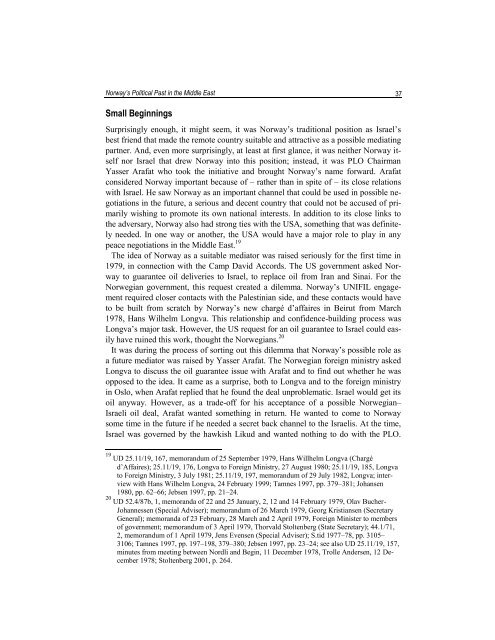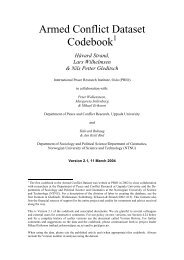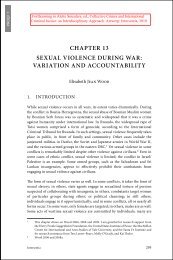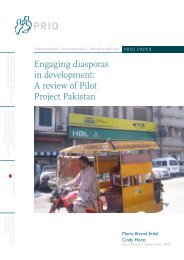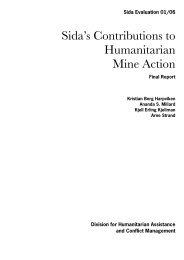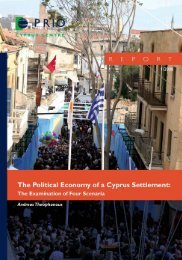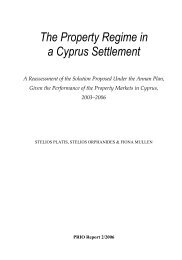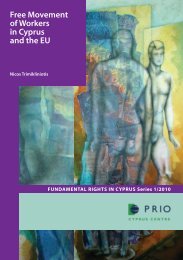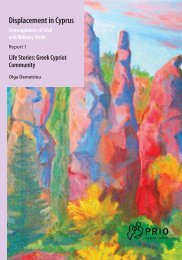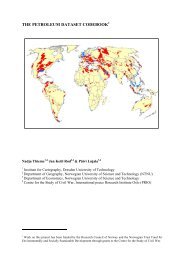Peacemaking Is a Risky Business - PRIO
Peacemaking Is a Risky Business - PRIO
Peacemaking Is a Risky Business - PRIO
Create successful ePaper yourself
Turn your PDF publications into a flip-book with our unique Google optimized e-Paper software.
Norway’s Political Past in the Middle East37Small BeginningsSurprisingly enough, it might seem, it was Norway’s traditional position as <strong>Is</strong>rael’sbest friend that made the remote country suitable and attractive as a possible mediatingpartner. And, even more surprisingly, at least at first glance, it was neither Norway itselfnor <strong>Is</strong>rael that drew Norway into this position; instead, it was PLO ChairmanYasser Arafat who took the initiative and brought Norway’s name forward. Arafatconsidered Norway important because of – rather than in spite of – its close relationswith <strong>Is</strong>rael. He saw Norway as an important channel that could be used in possible negotiationsin the future, a serious and decent country that could not be accused of primarilywishing to promote its own national interests. In addition to its close links tothe adversary, Norway also had strong ties with the USA, something that was definitelyneeded. In one way or another, the USA would have a major role to play in anypeace negotiations in the Middle East. 19The idea of Norway as a suitable mediator was raised seriously for the first time in1979, in connection with the Camp David Accords. The US government asked Norwayto guarantee oil deliveries to <strong>Is</strong>rael, to replace oil from Iran and Sinai. For theNorwegian government, this request created a dilemma. Norway’s UNIFIL engagementrequired closer contacts with the Palestinian side, and these contacts would haveto be built from scratch by Norway’s new chargé d’affaires in Beirut from March1978, Hans Wilhelm Longva. This relationship and confidence-building process wasLongva’s major task. However, the US request for an oil guarantee to <strong>Is</strong>rael could easilyhave ruined this work, thought the Norwegians. 20It was during the process of sorting out this dilemma that Norway’s possible role asa future mediator was raised by Yasser Arafat. The Norwegian foreign ministry askedLongva to discuss the oil guarantee issue with Arafat and to find out whether he wasopposed to the idea. It came as a surprise, both to Longva and to the foreign ministryin Oslo, when Arafat replied that he found the deal unproblematic. <strong>Is</strong>rael would get itsoil anyway. However, as a trade-off for his acceptance of a possible Norwegian–<strong>Is</strong>raeli oil deal, Arafat wanted something in return. He wanted to come to Norwaysome time in the future if he needed a secret back channel to the <strong>Is</strong>raelis. At the time,<strong>Is</strong>rael was governed by the hawkish Likud and wanted nothing to do with the PLO.19 UD 25.11/19, 167, memorandum of 25 September 1979, Hans Willhelm Longva (Chargéd’Affaires); 25.11/19, 176, Longva to Foreign Ministry, 27 August 1980; 25.11/19, 185, Longvato Foreign Ministry, 3 July 1981; 25.11/19, 197, memorandum of 29 July 1982, Longva; interviewwith Hans Wilhelm Longva, 24 February 1999; Tamnes 1997, pp. 379–381; Johansen1980, pp. 62–66; Jebsen 1997, pp. 21–24.20 UD 52.4/87b, 1, memoranda of 22 and 25 January, 2, 12 and 14 February 1979, Olav Bucher-Johannessen (Special Adviser); memorandum of 26 March 1979, Georg Kristiansen (SecretaryGeneral); memoranda of 23 February, 28 March and 2 April 1979, Foreign Minister to membersof government; memorandum of 3 April 1979, Thorvald Stoltenberg (State Secretary); 44.1/71,2, memorandum of 1 April 1979, Jens Evensen (Special Adviser); S.tid 1977–78, pp. 3105–3106; Tamnes 1997, pp. 197–198, 379–380; Jebsen 1997, pp. 23–24; see also UD 25.11/19, 157,minutes from meeting between Nordli and Begin, 11 December 1978, Trolle Andersen, 12 December1978; Stoltenberg 2001, p. 264.


